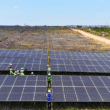Debt
 Tanzania Debt
Tanzania Debt
As of December 2019, Tanzania’s debt amounted to USD 28.6 billion (debt-to-gdp ratio of 52%) with external debt accounting for 78% of the total and domestic debt with 22%.
The funds were allocated mostly to the transport and telecommunications sectors (27%), followed by social welfare and education (17%), and energy and mining (15%).
Furthermore, in June 2020, the International Monetary Fund (IMF) approved a USD 14.3 million debt relief to Tanzania to help alleviate Tanzania’s balance of payments needs stemming from the COVID-19 pandemic.
The findings of the annual Debt Sustainability Analysis (DSA) conducted by the Tanzanian Government indicate that Tanzania’s public debt is sustainable, and the country remains at low risk of external debt distress. However, it is recognized that creating fiscal space for higher infrastructure investment is important to contain public debt surges and the associated repayment burden.
Tanzania External Debt
Tanzania’s external debt amounted to USD 22.4 billion (40% of GDP) in December 2019 representing a 6% YoY increase (2018: USD 21.06 billion).
The Tanzanian Central Government is the largest borrower holding 78% of the country’s external debt, followed by the private sector (21%), and public corporations (0.4%).
The proportion of debt owed to multilateral institutions is 46%, followed by commercial sources (34%), export credit (11%), and bilateral institutions (9%).
Tanzania Domestic Debt
Tanzania’s domestic debt amounted to USD 6.3 billion (11% of GDP) in December 2019 representing a 1% YoY decrease (2017: USD 6.2 billion).
Commercial banks are the largest creditor to the Tanzanian Government (37%), followed by pension funds (30%), others (13%), the BoT (9%), insurance (9%), and the BoT’s special funds (2%).







